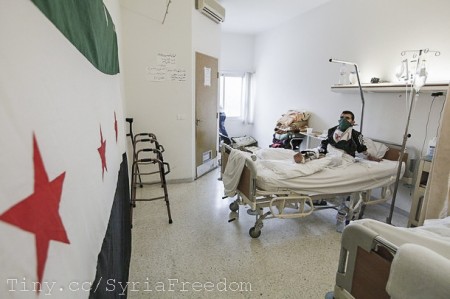
This article was originally published by The Conversation on 16 October, 2015.
The hospital bombed by US troops in Kunduz, Afghanistan, treated trauma patients, no matter whether they were civilians or Taliban fighters. The bombing happened as Afghan and US forces fought to drive Taliban out of the city the latter had captured just days before.
If the targeting of the hospital, which killed at least 22 people, had been an accident, it would leave no doubt about the return of war to the urban centres of Afghanistan. But knowledge of the hospital’s GPS coordinates by the US and Afghan armies and the precision of the attack suggest otherwise.
Both Afghan and US officials at one point in the aftermath suggested that they were targeting Taliban fighters on the hospital’s grounds, something that Médecins Sans Frontières, which runs the hospital, denies was the case. If the attack was in fact intentional, how can we make sense of such a breach of the Geneva conventions that forbid attacking humanitarian structures?
Ungoverned space
One way to make sense of it is to look at the growing influence of the concept of “ungoverned spaces” first developed by US think tanks, most notably the RAND Corporation. Spaces are considered ungoverned if they lack strong state control and if the social practices in these spaces are tribal or otherwise pre-modern. They pose high risks to the global order and the security of the US, especially if they are used as safe havens for (Islamist) terrorists.
In short, ungoverned spaces are portrayed as potential security threats which lie outside the moral framework of civilisation. What matters is less whether ungoverned spaces have any functioning social order, but if this social order is similar to Western states.
Think tanks, US Army reports, and academic researchers have put together different lists of ungoverned spaces all over the world. These include the Afghanistan/Pakistan border and parts of the Arabian Peninsula, as well as the Colombia/Venezuela border areas and large parts of East Africa, to name a few.
Broken sovereignty
It is, however, in the framework of the War on Terror that the concept of ungoverned spaces poses a serious threat to humanitarian aid. UK prime minister David Cameron has named Mali and the Afghanistan/Pakistan border as ungoverned spaces.
Since 2004, the concept of ungoverned spaces has become important for legitimising operations in the War on Terror which arguably break international law. The first invasions of the War on Terror not only failed to achieve stability in Afghanistan and Iraq, they also led to the rise of new jihadi insurgent groups. Among them the Tehrik-e Taliban in Pakistan, Al-Qaeda in Iraq, and now, arguably Islamic State.
With other jihadi groups spreading across the Middle East and Africa (in Syria, Yemen, Tunisia, Libya, Morocco, Nigeria, and Mali to name a few), the War on Terror shifted to targeting small groups or individual terrorists.
For most of the Obama administration, drone strikes have been the main means of carrying out such attacks. While the US argues that such attacks are a means of self-protection against future harm, they not only have led to a high number of civilian deaths, but also break the sovereignty of the states on whose territory they are performed.
Rewriting rules of warfare
The concept of ungoverned spaces offers a justification for this fine-tuning of intervention. In ungoverned spaces, the rules of warfare stated in the Geneva conventions seemingly do not hold. The targets stand outside the moral order of civilisation and outside the international order of states. In the border areas between Pakistan and Afghanistan – the most outstanding and most cited ungoverned space – the entire population has to live under the threat of drone strikes anywhere and any time.
As the logic of ungoverned spaces rewrites the rules of warfare, it also shakes the ideas at the basis of humanitarian aid. These principles are not to take a position in the conflict and to treat anyone in need, no matter what their ethnic, social, religious background or gender.
The concept of ungoverned spaces follows an opposite logic. A clear demarcation between “us” and “them” is drawn to divide human beings in two camps: the US-led alliance against terrorism and the “terrorists” themselves. In ungoverned spaces alleged “terrorists” will be hunted down. There are no safe spaces. Not even humanitarian hospitals. Anyone who goes into ungoverned spaces, and these spaces can shift quickly, can become a target. This situation makes humanitarian aid in ungoverned spaces at the same time necessary and impossible.
Janosch Prinz is a Lecturer in Political Theory at Queen’s University Belfast.

This work is licensed under a Creative Commons Attribution-NoDerivatives 4.0 International License.
For more information on issues and events that shape our world, please visit ISN Security Watch or browse our resources.

